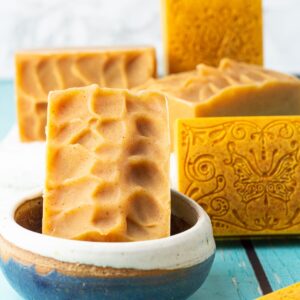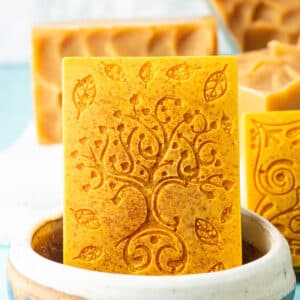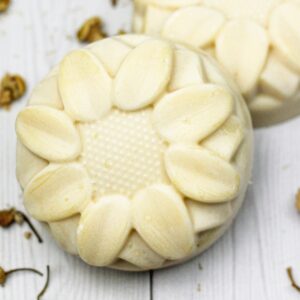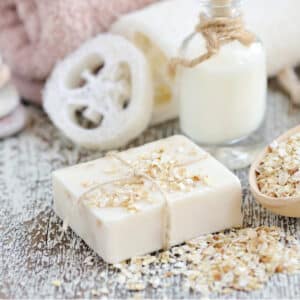
I hear you. Why would you want to go through the trouble of learning a new craft and purchasing new equipment and ingredients if you can simply buy commercially made soap for cheap?
Let me fill you in on why it could be well worth it.

1.Handmade soap is better for your skin
If there’s one thing I’ve learned over the years it is this:If something is cheap then there’s always a reason for it. Oftentimes it’s because the quality is junky and that’s certainly true for commercial bar soap.
You could say that I’m a bit of a label reading nerd. So, when I decided to write this article the first thing I did was check out the bar soap in my local supermarket. Let’s take a look at the ingredient list of a commercial bar of soap (the one with the feathery creature in the logo) shall we?
It goes something like this: Sodium Lauroyl Isethionate, Stearic Acid, Sodium Tallowate Or Sodium Palmitate, Lauric Acid, Sodium Isethionate, Water, Sodium Stearate, Cocamidopropyl Betaine, Sodium Cocoate Or Sodium Palm Kernelate, Fragrance, Sodium Chloride, Tetrasodium Edta, Tetrasodium Etidronate, Titanium Dioxide (Ci 77891)
Let me break this down for you. So we’ve got:
- Oils and fats and their derivatives: beef tallow (animal fat), coconut oil, palm oil or palm kernel oil, stearic acid and lauric acid. All of these have two things in common - they’re cheap and produce a very hard bar of soap. But they don’t add any nourishing properties (like olive oil or sweet almond oil would).
- Then we have surfactants (detergents) and lathering agents: Sodium Lauroyl Isethionate, Cocamidopropyl Betaine, Sodium Isethionate
- Chelating agents (something that helps soften water, helps to preserve the product and reduce soap scum): Tetrasodium Edta and Tetrasodium Etidronate are derived from formaldehyde but are "safe" in small amounts
- Salt (Sodium Chloride)
- Fragrance (although this is supposed to be an unscented bar)
- Colorant (Titanium Dioxide)
I don't know about you but I like my personal care products (just like the food I eat) to have only a few ingredients - preferably ones that I can actually pronounce.
Here's what a label on one of my soaps looks like: Sodium Sunflower Seedate (Sunflower Seed Oil), Sodium Palm Kernelate (Palm Kernel Oil), Sodium Cocoate (Coconut Oil), Water, Simmondsia Chinensis (Jojoba), Butyrospermum Parkii (Shea Butter), Sodium Chloride (Salt), Essential Oils
There’s another big reason handmade soap is better for your skin - Glycerin. Glycerin is a humectant, meaning it draws moisture out of the air to the skin surface and locks it in. The cool thing is that Glycerin is a byproduct of the process of turning oils or fats into soap. It doesn’t need to be added.
Commercial soap on the other hand has been stripped of all its glycerin. Big companies use it to make more profitable products like shampoos or lotions. That's the reason why it can feel drying at times. Commercial soap has one purpose only and that is to clean. There is nothing skin loving about it.
But wait! Isn’t handmade soap made with lye? Isn’t that bad for your skin?
Yes, lye is VERY bad for your skin. Luckily handmade soap is made with lye but it doesn't "contain" any lye. Huh, how is that possible? Lye is a highly alkaline substance. In soap making it gets mixed with oils (fatty acids) which triggers a chemical reaction called saponification. Saponification describes the process of turning lye + oil into soap + glycerin.
A bar of handmade soap that has been properly manufactured contains no more lye and is absolutely safe to use. Hurray!

2. It will save you money in the long run
Once you’re hooked on handmade soap there’s almost no going back. A good bar of handmade soap that you order online or buy at your health food store can easily run you 7$ or more.
There’s nothing wrong with that considering the amount of love and care that goes into producing it but it will get pricey very quickly. A bar of soap goes pretty fast in this house 😉 That's why I rely on my own soap for the bulk of my family's soap needs.
Let me put it this way: you can get fast food at your local corner store, you can go to a fine restaurant, or you can buy good quality ingredients and cook a great meal at home.
3. It’s totally customizable
Do you grow tomatoes and cucumbers in your garden? You can use them.
Are you a beekeeper or do you know one? You can make wonderful soap with beeswax and honey.
Feel like using goat's milk? Go for it!
You found a women's owned coop in Ghana? Why don't you use their shea butter to support them?
The great thing about making your own soap from scratch is that you can make it exactly the way YOU like it. Whether you prefer unscented, lavender scented, unicorn poop scented, yellow, blue, tie dye, round, heart, cupcake shaped- You can make it!
The possibilities are endless.

4. Last but certainly not least: It’s a ton of fun
If you’re a crafter and maker at heart like I am, you can find an amazing creative outlet here. There are so many things you can play around with: scents, colors, ingredients, techniques, packaging, and more.
When I plan a new soapy project it can easily take a few days for me to come up with a plan. I love that process. Imagining in my head what it will look like (although it very rarely ends up looking exactly the way I thought), what colors I will use, for whom it will be, what theme it will have, what recipe I will use, what mold would be best - the list could go on and on.
Then it comes to the actual making (the mad scientist part) which to me a meditative process of sorts. First, you really shouldn’t soap around kids or pets for safety reasons. So I go into my quiet little soap studio and get some much needed alone time. Second, I find that if I’m not totally focused I make mistakes.
And then comes the waiting part (poured soap should sit in its mold for at least 24 hours) until you finally get to cut into your soap. Even after a gazillion batches that moment is still priceless to me. How did my design come out? Did it work out the way I wanted?
After about 4 weeks curing time you get to enjoy it in the shower or gift it to others. How wonderful is that?
If you have never made soap before, why don’t you give it a shot? You might just find yourself a new hobby. Stay tuned for my Beginner’s Soap Series where I walk you through exactly what you need, what you need to know about working with lye, and how to actually make your first batch.
Until next time. Happy Tinkering!






Jana
Waiting for a recipe! I've been using handmade all natural soap for about 6 years now, and I'll never go back. I've just never been brave enough to make it myself. I worry that I'll invest in all the ingredients and supplies and then hate the process or mess it up somehow. But I DO like the idea of not needing to spend $5 per bar. I even use a shampoo bar soap, so if I could make THAT, too, I'd really be set!
Celine
Thank you commenting Jana 🙂 I have a Beginner Soap Series planned starting with lye safety, equipment needed and then the actual making of a batch of soap (with recipe, of course). So, stay tuned many recipes including Shampoo Bars will be coming your way here.
Gaby Eutebach
Liebe Celine, dass finde ich doch toll, was du neben deiner Arbeit als Mutter und Neubesitzerin fast einer kleinen Farm noch so alles produzierst. Demnächst vielleicht sogar mit Ingredienzien aus eigenem Anbau? Ich bin nach wie vor total begeistert von deinen Seifen, benutze nichts anderes mehr. Leider habe ich dadurch natürlich auch einen guten Verbrauch, aber deine Mutter hat mich zu Weihnachten noch einmal gut versorgt. Ich finde es sehr schön, dass du deine Erfahrungen und auch Rezepte allen zur Verfügung stellst. Vielleicht versuche ich es auch einfach mal selbst.
Ich wünsche dir viele Nachahmer und viel Erfolg und natürlich viele genauso Begeisterte wie mich. Wir drücken dir die Daumen...
Celine
Vielen Dank, Gaby. Es freut mich, dass dir meine Seifen gefallen. Ja, ich habe doch ganz gut zu tun im Moment, aber sonst waere es ja auch langweilig 😉
Viele liebe Gruesse, Celine